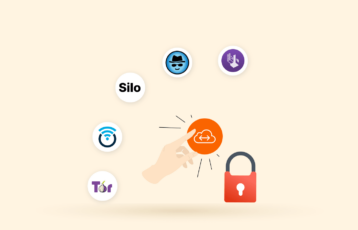Blockchain is one of the safest systems on the planet. It is the technology that cryptocurrencies use to operate, but not all cryptos are private by design. In fact, you can identify many crypto-coin transactions by digging into the public information they share.

For some users, exposure is not an issue, but it is for those who use crypto only for privacy reasons. The latter group needs a cryptocurrency that’s 100% private. Even though there’s no unique method to reach this goal, the discussion remains open when defining the best system to keep cryptographic investments anonymous.
Let’s discover the top 9 most private cryptocurrencies in the crypto sphere and their methods to guarantee a 100% anonymous experience.
Note: The purpose of this article is only to provide information. Cryptocurrencies employ sophisticated encryption and privacy features to protect user anonymity to an extent. And it’s correct that several cryptocurrencies have built-in privacy features or options for more private online commerce. But, no cryptocurrency can guarantee full anonymity since most transactions are publicly recorded and accessible. There are methods to hide the identities or transaction history on the Bitcoin network, such as cryptocurrency mixers. However, that requires technical know-how and comes with transaction fees.
Top private cryptocurrencies to consider – Quick list

- Monero (XMR): Live since April 2014, Monero is a cryptocurrency that prioritizes privacy and decentralization. This coin initially emerged as a bifurcation of Bytecoin but managed to climb levels in the crypto space with outstanding privacy features like stealth addresses and ring signatures.
- Dash (DASH): Evan Duffield launched Dash in 2014 under the name Darkcoin. He intended to create a more efficient version of Bitcoin. Nowadays, Dash has one of the best reputations in the crypto world with remarkable characteristics like its decentralized second-tier Masternode network.
- ZCash (ZEC): It has earned its spot in the crypto verse thanks to cutting-edge crypto techniques that allow them to guarantee privacy at all times. ZCash has been in the market since 2016 and continues to be a one-of-a-kind digital asset thanks to the mindblowing capabilities Zooko Wilcox, the company behind ZEC, develops daily.
- Horizen (ZEN): It is a resounding private option, been in the market since 2017, offering both confidential and transparent transactions for users, but not only that, Rob Viglione and Rolf Versluis (ZEN’s founders); took privacy to a new level with several applications such as private messaging between users.
- Verge (XVG): Formerly known as DogeCoinDark, Verge is one of the private cryptocurreny in the market (since 2014) that has seen massive user adoption by partnering with a range of businesses that accept the crypto for online purchases.
- Grin (GRIN): One of the newest on this list, it has been life since 2019. You can get an idea of how private the crypto is by knowing that its founder continues in anonymity to this day. Ignotus Peverell’s goal, GRIN’s anonymous founder, is to make the crypto coin scalable and 100% private.
- Bytecoin (BNC): It is another crypto whose founders continue to be anonymous. BCN has been available since 2012 when it was known as Bitmonero. Out of many remarkable features, BCN has the most untraceable payment system.
- Beam (BEAM): Another newbie in the crypto world, it has been available for purchase since 2019. Along with the Beam Team, Alex Romanov, its founder, has made this coin not only a private option; but also a safe one. It’s one of the few that complies with government regulations.
- ROSE: Closing the list, it’s the ambitious cryptocurrency ROSE. Oasis Network’s digital coin was born in 2019. This one-of-a-kind crypto aims to offer 100% private transactions; and a distributed network for data privacy and security.
What is a private cryptocurrency?

For a user to understand what privacy means in the crypto world, the best approach is to differentiate between the two types of existing transactions. For one part, there are so-called “transparent” transactions, and for the other, there are private ones. Consequently, users can find two types of cryptos in the market: transparent and private.
Transparent cryptos allow users to deploy chain analyses and see the public addresses in the operations, meaning all info is public and available. On the opposite note, privacy coins protect the users’ private information by being untraceable and anonymous.
While transparent coins provide users with a fine experience, for customers who wish to protect their privacy at all costs, a privacy coin is the best option.
In short, a private cryptocurrency is one where neither the identities of the sender nor transactions are traceable on the blockchain.
How does private crypto work?
Anonymous cryptocurrencies employ various techniques to maintain transaction privacy. Cryptography is the most common method, which converts readable data into unreadable gibberish. This prevents third parties from reading the data.
Private coins use cryptography in two ways. The first way is to protect the transactions. It encrypts the transactions so only the involved parties can access the exchange.
Private coins use cryptography to control coin creation, a process known as mining. This is where computers solve complex mathematical problems to verify and add new transactions to the cryptocurrency blockchain. Miners get newly created coins for their efforts.
Ring signature is another method untraceable cryptocurrencies use to keep transactions private. It mixes a public key from the blockchain with the user’s account key to create a ring of possible ringers. As a result, it becomes impossible to know the private keys used to sign a transaction and the user. Some private coins use zero-knowledge proof, where the user proves cryptocurrency ownership without revealing transaction information. So, third parties cannot track or snoop on users’ activity.
How can you buy cryptocurrency safely?
Undeniably, cryptocurrencies have become more popular as thousands of options in the form of digital exchanges have flooded the market. But it is also true that not all crypto exchanges are trustable.
The fact that cryptocurrencies are decentralized facilitates scams to spread smoothly around the community. If you want to avoid buying from unscrupulous exchanges, these are some tips for you to follow:
1. Ensure the platform follows KYC and AML protocols
One of the first elements to consider when deciding how trustable an exchange is, it’s to know if they follow “Know Your Customer” (KYC) and “Anti-Money Laundering” (AML) guidelines.
KYC verifications are mandatory to transact on trustable exchanges; this doesn’t necessarily mean your identity will be visible on the operation; it is just a safe way for the crypto exchange to determine who you are and the provenance of your funds.
2. Choose a platform with a good reputation
Another good practice is to dig deep into the prestige of the crypto exchange you want to use. Do some research and ensure your crypto exchange has been in the market for at least two years, and that appears as a recommendation for a few crypto forums like Reddit, Steemit, or Bitcointalk.
3. Start with small transactions
Even if you have checked the previous steps, the best tip to transact safely on a crypto exchange is to start with small amounts. Try buying a tiny fraction (around 10%) of the total amount you need; if it works, it’s a good sign that you can buy a more extensive fraction of the total or the whole amount.
4. Check for testimonials
Checking for testimonials of previous users is a no-brainer. Ensure you carefully read the comments on the website and crypto forums to know the experience of other users buying crypto in that exchange.
Pro tip: Besides following the tips above, we recommend using a crypto VPN for safely buying and trading digital assets.
Is investing in most private cryptocurrencies worth it?

Private coins create a new opportunity for investors by combining privacy and security. However, before investing in them, it is important to understand their rewards and risks.
Pros
Privacy
Private coins enable you to transact without exposing your personal information. This is an advantage since cryptocurrency data is in high demand.
Contrary to popular belief, Bitcoins are not entirely private. The public nature of the Bitcoin blockchain means anyone can see the transactions on the network.
Moreover, most Bitcoin exchanges require you to verify your identity, linking your personal information to your transactions. Private cryptocurrency is a solution to these security concerns.
Security
Hackers stole around $14 billion from crypto investors in 2021. Unfortunately, this alarming trend of cryptocurrency theft is expected to intensify as more people continue to invest in cryptocurrency.
Private coins use a zero-knowledge proof technique, eliminating the need to reveal your information during transactions. This protects your funds from potential theft.
Cons
Attractive to criminals
The privacy features that make private cryptocurrency attractive to individuals also make them appealing to criminals. They use these coins for illegal activities like drug trafficking.
These security concerns prevent banks and financial institutions from adopting cryptocurrencies. Also, governments are implementing strict regulations and restricting cryptocurrency exchanges.
Not widely accepted
Private coins are not widespread, so you might not find a place to use them. Usually, you can only spend them on other digital assets or goods and services that specifically accept anonymous cryptocurrencies.
The lack of acceptance is mainly because private cryptocurrency is still an emerging concept. It might take some time to be accepted. So, you need to convert your private coins to widely accepted assets like Bitcoin to spend them.
9 most confidential cryptocurrencies in 2024 – Detailed list
Finding anonymous cryptocurrencies is difficult. Therefore, we have done the job for you. Below are the private or untraceable cryptocurrencies based on our thorough research and tests. In addition, this list is for information and privacy purposes only. We strongly prohibit using anonymous coins for criminal or other illegal activities.
1. Monero (XMR)

It has the highest market capitalization out of the nine most secure cryptocurrencies to buy in this list. One of the most significant privacy protections of Monero is the use of covert addresses that Monero’s recipients employ as proxy addresses. These addresses are created on each transaction, and initially receive the funds sent to the recipient’s address.
Main features:
- Privacy
- Security
- Untraceability
- Open Source
Technology:
- CryptoNote protocol
- Ring signatures
- Stealth addresses
Applications:
- Anonymous transactions
- Secure payments
- Private Messaging
Pros and cons:
Monero’s (XMR) pros usually lie in its privacy and security. However, the constant use of this crypto for illegal activities on dark web sites and darknet markets is the main drawback of the coin.
2. Dash (DASH)

A popular cryptocurrency that boasts fast transactions and low fees thanks to its unique governance structure. Masternodes are one of the essential features of Dash, as they enable PrivateSend, which obscures the transaction trail. Dash also employs Proof of Stake, encouraging holding Dash for long-term gains rather than constantly buying and selling.
Main features:
- Fast transactions
- Low fees
- Governance
- Open source
Technology:
- Proof of Stake
- Masternodes
- PrivateSend
Applications:
- Peer-to-peer payments
- Remittances
- Online purchases
Pros and cons:
Dash’s fast and low-cost transactions are the signature pros of the coin. Nonetheless, the lack of decentralization and accusations of the Core Group controlling the governance have been a constant setback for the crypto.
3. ZCash

Considered the most private crypto in the market, ZCash (ZEC) fuses transparency, and transactions are private by default using its “Selective transparency” feature. Moreover, one of its fortes is that it integrates a robust cryptographic method, the zero-knowledge proof or Zk-SNARKs, that enables 100% private operations.
Main features:
- Privacy
- Security
- Selective transparency
- Open source
Technology:
- Zk-SNARKs
- Equihash
- Shielded transactions
Applications:
- Anonymous transactions
- Secure payments
- Permissionless exchange
Pros and cons:
ZCash cryptocurrency’s main benefits are privacy and advanced cryptographic technology. On the other hand, users often critique the trusted setup process and the reliance on Zk-SNARKs.
4. Horizen (ZEN)

It differs from other private cryptos by focusing on interoperability and scalability. Zendoo, its blockchain technology, allows users to have custom sidechains and cross-chain transfers. On top of this, the employment of zero-knowledge proofs allows the crypto to have private transactions.
Main features:
- Privacy
- Security
- Scalability
- Open source
Technology:
- Zk-SNARKs
- ZendooA
- Sidechain scalability
Applications:
- Anonymous transactions
- Private Messaging
- dApps
Pros and cons:
Horizon’s crypto stands out for its privacy and scalability improvements. However, the lack of adoption and being overshadowed by other privacy coins represents a significant issue.
5. Verge (XVG)

A privacy-focused cryptocurrency that uses Tor and I2P networks to ensure anonymous transactions. It also employs the Wraith Protocol, which allows users to choose between private and public ledgers. Verge focuses on being user-friendly and easy to use, with many wallets available for different platforms.
Main features:
- Privacy
- Security
- Fast transactions
- Open source
Technology:
- Tor
- I2P
- Wraith Protocol
Applications:
- Anonymous transactions
- Online purchases
- Private Messaging
Pros and cons:
The pros lie in how fast and private Verge (XVG) is. In contrast, multiple successful attacks and vulnerabilities have put the crypto in a difficult position.
6. Grin (GRIN)

To Grin (GRIN), privacy is a top priority; this cryptocurrency enables confidential transactions using Mimblewimble, its featherweight protocol. Grin didn’t have an ICO or pre-mine launch, and it’s a standout for its fairness and scalability focus.
Main features:
- Privacy
- Scalability
- Fair launch
- Open source
Technology:
- Mimblewimble
- Proof of Work
Applications:
- Anonymous transactions
- Store of value
- Mining
Pros and cons:
The pros of this coin have to do with privacy and its fair launch with no pre-mine. On the contrary, the lack of user-friendly wallets and their volatility are its main stumbling blocks.
7. ByteCoin (BCN)

A privacy-focused cryptocurrency that uses the Cryptonote protocol to enable anonymous transactions. Its unique feature is its use of untraceable and fair emissions with a gradual increase in block rewards over time. Bytecoin also uses ring signature technology to obscure transactions to an untraceable sender.
Main features:
- Private transactions
- Untraceability
- Fair emission
- Open source
Technology:
- Cryptonote
- Ring Signature
- SPECTRE
Applications:
- Anonymous transactions
- Private Messaging
- Store of value
Pros and cons:
The main benefits of the BCN coin include its one-of-a-kind privacy and fair emissions policy. Meanwhile, the cons this crypto receives comprise excessive pre-mining and poor user adoption.
8. Beam (BEAM)

A privacy-focused cryptocurrency that uses Mimblewimble and Lelantus-MW to improve its privacy and confidentiality features. This crypto strongly focuses on being user-friendly, with intuitive wallets available for multiple platforms. Beam also prioritizes scalability by implementing beam-sync, a fast and efficient way for new participants to catch up with the current blockchain state.
Main features:
- Privacy
- Scalability
- User-friendly
- Open source
Technology:
- Mimblewimble
- Proof of Work
- Lelantus-MW
Applications:
- Anonymous transactions
- Private Messaging
- Store of value
Pros and cons:
It boasts a user-friendly approach for privacy and scalability, thus standing out from most private crypto currency. But on the other hand, Beam’s main cons are the centralized nature of its development and the lack of adoption.
9. Oasis Network (ROSE)

It aims to tackle privacy and interoperability at the same time. By implementing the ParaTime architecture, Oasis Network offers private sidechain executions while prioritizing safe and confidential experiences with its Smart Contracts feature, which enables confidential and decentralized operations.
Main features:
- Privacy
- Scalability
- Interoperability
- Open source
Technology:
- Confidential smart contracts
- ParaTimes
- ROSE Token
Applications:
- Confidential computing
- Decentralized finance
- dApps
Pros and cons:
Rose’s advantages rely on privacy and interoperability. The cons, on the other hand, rely on the early stages of the coin and the lack of adoption.
Important disclaimer: Be aware that the information contained in this article neither represents nor substitutes financial instructions or professional advice. All information displayed in this piece intends to inform and serve as an educational source; the reader must be mindful that all tips and overall guidance; solely represent the writer’s personal opinion.
Tips for keeping your cryptocurrency safe
Getting your hands on the most private coins and storing them safely is something you should take with caution. Specifically, you can use the following tips for a safer experience:
- Ensure to buy cryptocurrencies safely: You must ensure the place you’re buying your crypto from is the best option. To do this, make sure to follow the steps explained above.
- Know deeply the crypto you’re considering: Do your research and get familiar with all the information about the cryptocurrency you’re turning to. Some helpful bullet points to gather before getting it should be volatility, market cap, safety, privacy, etc.
- Store your crypto safely: The best option to keep your crypto safe is to use a “cold wallet,” you just need to research the option that best fits your needs and start storing your digital coins safely.
Top safest cryptocurrency exchanges
By this point, you already know the safest ways to store the best private cryptocurrencies you buy. Meanwhile, take a look at the top 5 safest cryptocurrency exchanges we recommend:
1. eToro

- Website URL: etoro.com
Available in 70+ countries with more than 15 cryptocurrencies, eToro is a solid crypto exchange with the best reputation in crypto forums. Due to its friendliness behavior, this platform is notable for beginners.
2. Binance

- Website URL: binance.com/en
Binance is available in 175+ countries and accepts probably the largest number of cryptocurrencies (100+) in the market. Notably, this exchange combines a range of funding options with surprisingly low fees. Consider using a VPN with Binance for the best possible experience on it.
3. Coinbase
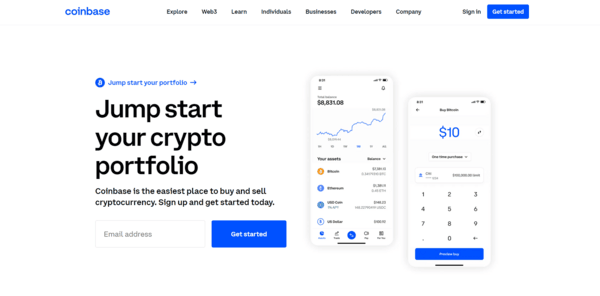
- Website URL: coinbase.com
Over 100 cryptocurrencies are available in this cutting-edge crypto exchange in more than 100 countries. The overall UX/UI stands out and creates a simple experience for new and advanced traders.
4. Kraken
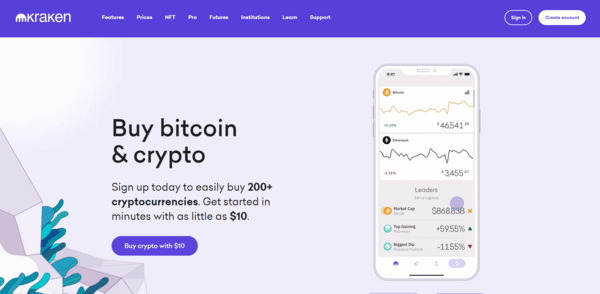
- Website URL: kraken.com
Kraken is a trustworthy exchange with the most extensive net of countries (150+). It supports 20+ cryptocurrencies and payment methods, making the platform one with the amplest trading volume.
5. Bitstamp
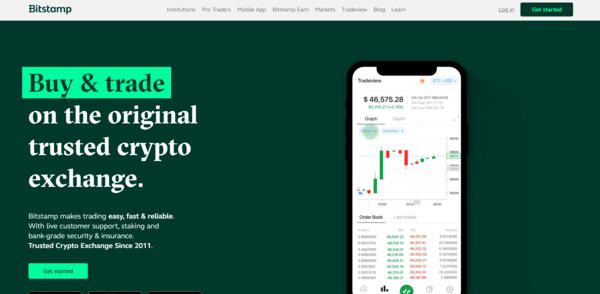
- Website URL: bitstamp.net
One of the oldest Bitcoin marketplaces, Bitstamp is a crypto exchange famously known for helping more than 3 million users when purchasing anonymous crypto.
Legality of private coins
Regulators worldwide have heightened scrutiny on privacy coins to crack down on black markets that rely on these coins. For example, Japan bans private coins completely, while South Korea and Australia ban exchange platforms that offer private coins.
Strict ‘Know your Customer’ laws by anti-money laundering regulators could further make it difficult to use privacy coins. This includes the AMLD-5 directive by the European Union and the FATF Travel Rule.
Are privacy coins really private?
It is difficult to say privacy coins are truly private. This is because of the continued advancement of analytical tools and the potential for future computers to crack modern encryption methods. Despite these concerns, privacy coins have shown resilience under the current encryption methods.
Is Bitcoin a privacy coin?
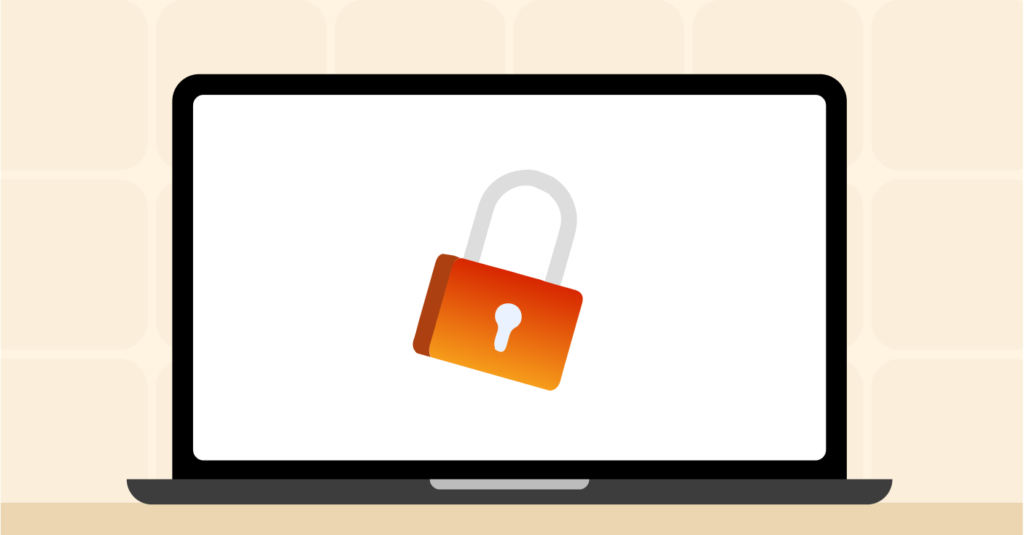
Bitcoins are known for being anonymous, so criminals adopted them as a preferred payment method in the dark web marketplaces in the early years.
However, the reality paints a different picture. Bitcoin’s blockchain is public, which means anyone can track the Bitcoin transactions on the network at any time.
Like other blockchain networks, the Bitcoin protocol does not guarantee anonymity. However, it provides pseudonymity. This means knowing who owns a Bitcoin address (which looks like a string of numbers and letters) is impossible unless someone publicly claims ownership.
Thankfully, you can use tools from reputable blockchain analytics companies like Chainanalysis to narrow down the search. These tools find connections in transaction criminals.
What else should I know about cryptocurrency?
Oddly enough, the concept of cryptocurrencies is barely new. Many users, or newbies, fail to have the proper knowledge to transact with these assets. These are some of the topics we recommend you look at before getting involved with cryptocurrencies:
- Blockchain technology
- Encryption systems
- Private coins.
- Transparent exchanges
- Open-source
FAQs
Bitcoin is a public crypto. Although the information is not immediately visible, people can dig into the public ledger to disclose the Bitcoin transaction data.
eToro and Binance are generally two of the best crypto exchanges in the market. Moreover, these exchanges provide a 100% private experience for the user.
The most private crypto wallets are Cold Wallets, a hardware storing method that ensures your crypto assets are always safe.
Firstly, research which anonymous cryptos in the market best fit your needs. Then, once you have chosen the most secure crypto, look in exchanges like eToro or Binance for that cryptocurrency and follow the purchase process of the platform.



